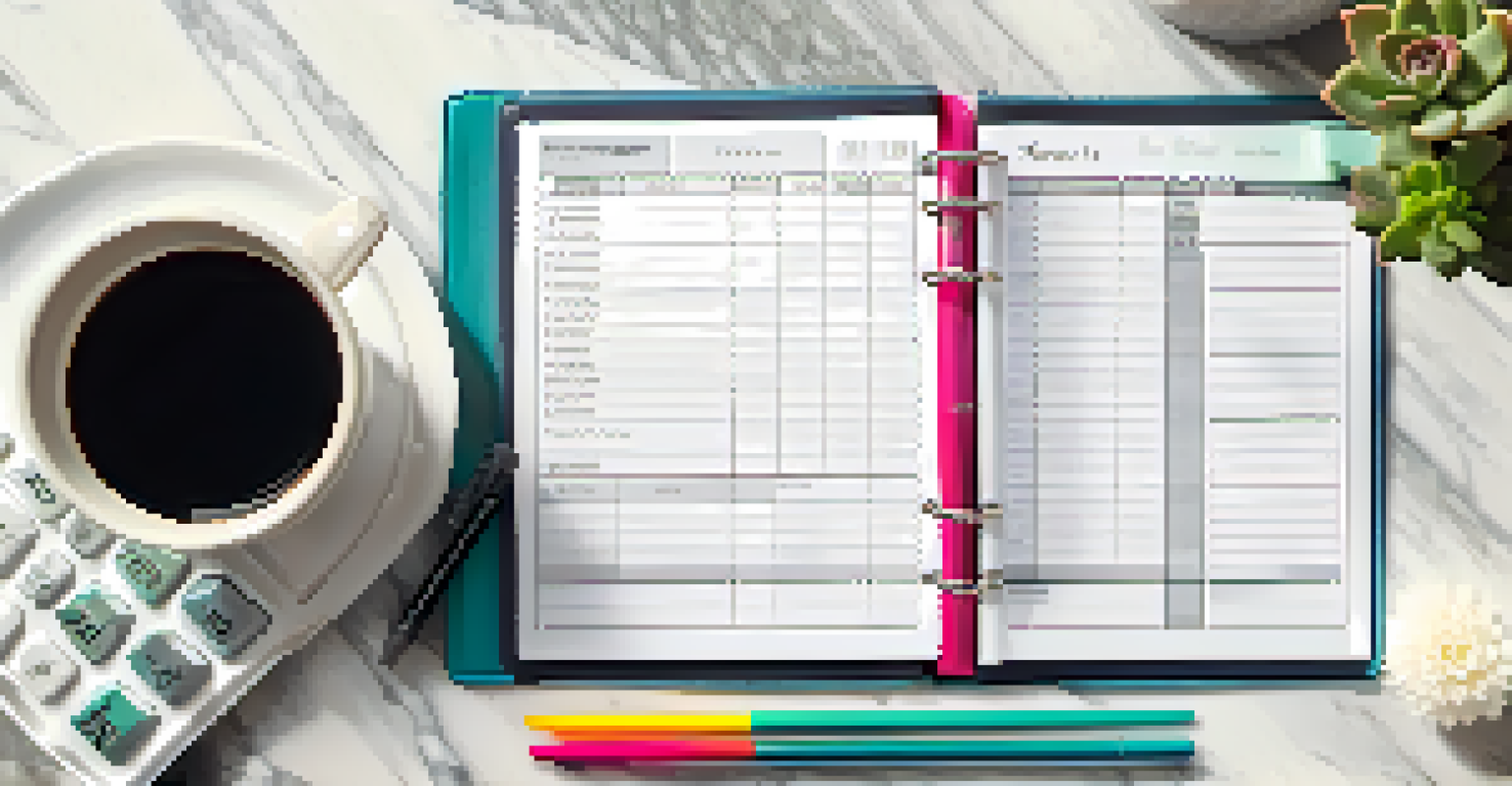Emergency Fund: A Key Component of Risk Management

Understanding Emergency Funds and Their Importance
An emergency fund is a financial safety net designed to cover unexpected expenses like medical bills or car repairs. Think of it as your financial first-aid kit, ready to help you in times of need. Having this fund can prevent you from falling into debt during unforeseen circumstances, providing peace of mind.
An investment in knowledge pays the best interest.
Many financial experts recommend saving three to six months' worth of living expenses in your emergency fund. This cushion ensures that you have enough resources to cover your basic needs while you navigate through tough times. It’s not just about saving; it’s about creating a buffer that helps you weather financial storms.
Incorporating an emergency fund into your financial plan is a key component of risk management. Just like wearing a seatbelt can reduce the impact of a car accident, having an emergency fund minimizes the financial impact of life’s unexpected events.
How Emergency Funds Mitigate Financial Risks
Emergency funds play a crucial role in risk management by providing immediate access to cash when life throws curveballs at you. For instance, if you suddenly lose your job, having an emergency fund allows you to pay bills without resorting to high-interest loans or credit cards. This immediate access can save you from long-term financial strain.

Moreover, emergency funds can help you avoid making hasty financial decisions. When faced with unexpected expenses, it’s easy to feel pressured to find quick solutions. With a financial buffer in place, you can take a breath and make thoughtful choices rather than panicking.
Emergency Funds Provide Financial Security
An emergency fund acts as a financial safety net, helping you cover unexpected expenses without falling into debt.
Think of your emergency fund as a protective shield against financial risks. It empowers you to face uncertainties without compromising your financial stability, allowing you to manage risks more effectively.
Setting Up Your Emergency Fund: Steps to Take
To establish an emergency fund, start by determining your monthly expenses. This will give you a clear target for how much you need to save. Break this down into manageable milestones to make the process less daunting; for example, aim to save $500 initially and gradually build up from there.
The secret to getting ahead is getting started.
Next, choose a separate savings account for your emergency fund. This helps keep your funds distinct from your everyday spending money and makes it less tempting to dip into. Look for accounts that offer easy access and minimal fees to ensure that your money is both safe and readily available when needed.
Finally, automate your savings. Set up a recurring transfer from your checking account to your emergency fund each month. This way, saving for emergencies becomes a habit and you won’t even notice the money leaving your account until you need it.
When to Use Your Emergency Fund Wisely
It’s essential to use your emergency fund wisely. This means reserving it for genuine emergencies—like medical emergencies, job loss, or unexpected home repairs—rather than non-urgent expenses. If you find yourself considering using this fund for a new gadget or vacation, it’s a sign to rethink your priorities.
A good rule of thumb is to ask yourself if the expense is necessary for your well-being or financial stability. If it’s not, it’s best to find alternative funding sources. This discipline will help ensure your emergency fund remains intact for when you truly need it.
Smart Savings Strategies for Everyone
Anyone can benefit from an emergency fund regardless of income, as small contributions can build a significant safety net over time.
Remember, an emergency fund is like a lifeboat; it’s there to keep you afloat during turbulent times. Using it wisely will ensure that it serves its purpose effectively.
Common Myths About Emergency Funds Debunked
One common myth is that emergency funds are only for people with high incomes. In reality, anyone can benefit from having an emergency fund, regardless of their financial situation. Even small, consistent contributions can build a significant safety net over time, making it accessible for everyone.
Another misconception is that you should only save for emergencies after paying off all debts. While reducing debt is important, having an emergency fund can actually help you avoid accruing more debt when unexpected expenses arise. Think of it as a preemptive measure to keep you from financial strain.
Lastly, some believe that once an emergency fund is established, it doesn’t need to be revisited. In truth, your financial situation and expenses may change, so it’s crucial to periodically reassess and adjust the amount in your fund to ensure it meets your current needs.
Emergency Fund vs. Savings Account: What’s the Difference?
While both an emergency fund and a savings account serve important roles in your financial life, they are not the same. An emergency fund is specifically designated for unexpected expenses, while a savings account may hold money for future goals like a vacation or a new car. This distinction is vital for effective financial planning.
An emergency fund should ideally be easily accessible but kept separate from your everyday spending. This helps reduce the temptation to use it for non-emergencies. On the other hand, your savings account can be more flexible, allowing for various financial goals and short-term savings.
Use Your Fund for True Emergencies
It's crucial to reserve your emergency fund for genuine emergencies, ensuring it remains available for when you truly need it.
Understanding these differences helps in structuring your finances smartly. By clearly defining these funds, you can allocate money effectively and ensure that you’re prepared for whatever life throws your way.
The Long-Term Benefits of Having an Emergency Fund
Building an emergency fund not only provides immediate financial relief but also contributes to long-term stability. By having this fund, you’re less likely to fall into the trap of high-interest debt, which can create a cycle of financial stress. This foresight can lead to more significant savings and investments down the line.
Additionally, having an emergency fund fosters a sense of security and confidence in your financial journey. You’ll sleep better at night knowing that you are prepared for unexpected events, which can improve your overall well-being. This peace of mind allows you to focus on your goals rather than worrying about potential setbacks.

Ultimately, the long-term benefits of an emergency fund extend beyond mere financial stability. It empowers you to take calculated risks, pursue opportunities, and make informed financial decisions, knowing you have a safety net in place.